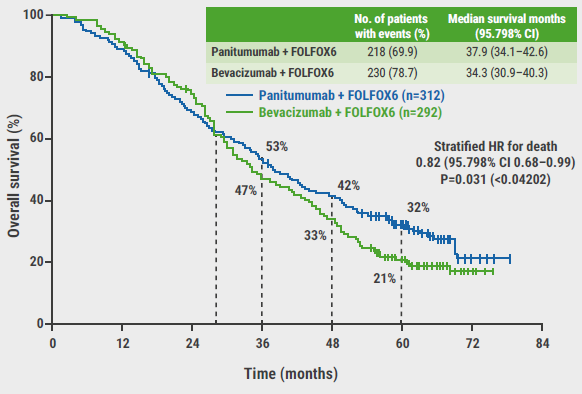https://doi.org/10.55788/b505249e
Until January of last year, platinum-based chemotherapy followed by surveillance was the standard first-line treatment for patients with advanced urothelial cancer. In the current phase 2 ATLANTIS screening trial (ISRCTN25859465), Prof. Robert Jones (University of Glasgow, UK) and colleagues evaluated whether patients with advanced urothelial cancer who are ineligible for inclusion in precision-medicine arms of maintenance therapy trials respond to cabozantinib [1]. Patients with advanced urothelial cancer received 4–8 cycles of first-line chemotherapy and were subsequently randomised 1:1 to cabozantinib (40 mg, oral, once daily) or placebo if they tested negative for all biomarkers. Recruitment of patients was stopped early, because research in the meantime demonstrated that avelumab may become the standard-of-care in the maintenance setting of patients with this indication [2]. Therefore, it was unethical to randomise patients to the placebo arm, leaving the total number of randomised patients to 61. Progression-free survival (PFS) was the primary outcome.
The median PFS was 13.7 months in the cabozantinib arm and 15.8 months in the placebo arm (HR 0.89; P=0.35), not reaching the primary endpoint. The median overall survival rates demonstrated similar results (cabozantinib 75.5 months vs placebo 82.9 months; HR 0.80; P=0.25). In terms of safety, anorexia, diarrhoea, fatigue, hypertension, hypothyroidism, rash, and neutropenia were more common in the cabozantinib arm. According to Prof. Jones, these were all known and manageable adverse events of this agent.
“This study does not support further investigation of cabozantinib as single agent maintenance therapy after platinum-based chemotherapy in patients with advanced urothelial cancer,” concluded Prof. Jones.
- Jones RJ, et al. A randomised, double blind, phase II clinical trial of maintenance cabozantinib following chemotherapy for metastatic urothelial carcinoma (mUC): Final analysis of the ATLANTIS cabozantinib comparison. LBA4505, ASCO 2022 Annual Meeting, 3–7 June, Chicago, IL, USA.
- Powles T, et al. N Engl J Med. 2020;383(13):1218–1230.
Copyright ©2022 Medicom Medical Publishers
Posted on
Previous Article
« 177Lu-PSMA-617 is a valid treatment option for PSMA-positive mCRPC Next Article
Adjuvant everolimus did not benefit high-risk renal cell carcinoma »
« 177Lu-PSMA-617 is a valid treatment option for PSMA-positive mCRPC Next Article
Adjuvant everolimus did not benefit high-risk renal cell carcinoma »
Table of Contents: ASCO 2022
Featured articles
Breast Cancer
Sacituzumab govitecan meets primary endpoint
Shaky OS results of palbociclib in ER-positive/HER2-negative breast cancer
Practice-changing results of T-DXd in HER2-low breast cancer
SET2,3 to inform on chemotherapy decisions in ER-positive breast cancer
Metastasis-directed therapy fails in oligometastatic breast cancer
Analysis by residual cancer burden further clarifies effect of pembrolizumab
Contribution of metastatic therapies on mortality reduction in breast cancer
Radiotherapy may be omitted in breast cancer patients
Promising data for ribociclib after progression on ET plus CDK4/6 inhibitors in HR-positive/HER2-negative metastatic breast cancer
7-gene biosignature: Benefits of endocrine therapy and radiotherapy in breast cancer risk groups
Lung Cancer
Additional tiragolumab does not help patients with untreated small cell lung cancer
Success for serplulimab plus chemotherapy in small cell lung cancer
Adagrasib safe and clinically active in non-small cell lung cancer
Long-term benefits of combined immunotherapy over chemotherapy in non-small cell lung cancer
Effect of KRAS mutations and PD-L1 expression on therapy response in non-small cell lung cancer
Melanoma
First results on distant metastasis-free survival in stage II melanoma
Higher response rates for concurrent triple therapy versus sequential therapy in melanoma
Genitourinary Cancers
Exploratory treatment options fail in ccRCC
Adjuvant everolimus did not benefit high-risk renal cell carcinoma
Cabozantinib fails as first-line maintenance therapy in urothelial cancer
177Lu-PSMA-617 is a valid treatment option for PSMA-positive mCRPC
Enzalutamide performs well in metastatic hormone-sensitive prostate cancer
Haematologic Malignancies
Autologous stem cell transplantation plus RVd improves PFS in multiple myeloma
Novel first-line treatment option for mantle cell lymphoma
Promising results for novel CAR-T therapy in relapsed/refractory multiple myeloma
Gastrointestinal Cancers
Panitumumab beats bevacizumab in RAS wildtype left-sided metastatic colorectal cancer
Spectacular results for dostarlimab in mismatch repair deficient rectal cancer
Triplet chemotherapy beats doublet chemotherapy in colorectal cancer liver metastases
To resect or not to resect primary tumours in stage IV colon cancer?
Novel treatment option for KRAS wildtype pancreatic cancer
Gynaecological Cancers
Primary results of rucaparib in ovarian cancer
Trabectedin not superior to chemotherapy in recurrent epithelial ovarian cancer
Encouraging results of relacorilant in ovarian cancer
Miscellaneous Topics
Bacterial decolonisation effective against radiation dermatitis
New standard-of-care for cisplatin-ineligible locally advanced head and neck squamous cell carcinoma
Ifosfamide is likely to be the go-to therapy in recurrent Ewing sarcoma
Dabrafenib plus trametinib candidates for standard-of-care in BRAF V600-mutated paediatric low-grade glioma
Related Articles

August 5, 2022
Novel treatment option for KRAS wildtype pancreatic cancer
© 2024 Medicom Medical Publishers. All rights reserved. Terms and Conditions | Privacy Policy
HEAD OFFICE
Laarderhoogtweg 25
1101 EB Amsterdam
The Netherlands
T: +31 85 4012 560
E: publishers@medicom-publishers.com

